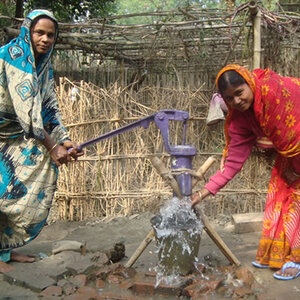Treated Wastewater Could Provide Alternative Water Source, Study Finds
Treated wastewater from domestic, agricultural, and industrial sources could prove invaluable in meeting the growing global demand for freshwater and other critical resources, a report from UN-Water finds.
Released on World Water Day, the United Nations World Water Development Report 2017: Wastewater: The Untapped Source (198 pages, PDF) argues for a paradigm shift in wastewater management from "treatment and disposal" to "reuse, recycle, and resource recovery," which it touts as a reliable alternative to freshwater supplies that are under stress from a growing global population. According to the report, two-thirds of the world's population currently lives in areas that experience water scarcity for at least one month a year, even as large volumes of untreated wastewater are released into the environment or reused for agricultural irrigation, polluting water sources and contaminating crops. In 2012, 842,000 deaths in low- and middle-income countries were linked to contaminated water and inadequate sanitation services.
Improving the supply and quality of water as well as sanitation services, the report argues, would significantly help reduce health risks and contribute to progress toward the United Nations' Sustainable Development Goals. Coordinated by the UN World Water Assessment Programme of UNESCO, the study also finds that wastewater can provide a cost-efficient and sustainable source of energy, nutrients such as phosphorus and nitrates, and organic matter — with potential benefits for human and environmental health, food and energy security, and climate change mitigation.
While several countries already are using safely treated wastewater to increase the availability of potable water, challenges to improved wastewater management include lack of infrastructure. To that end, the report calls for more accommodative legal and regulatory frameworks, the creation of cost recovery and financing mechanisms, greater support for knowledge- and capacity-building in the field, and robust advocacy efforts aimed at convincing policy makers of the cost of inaction in terms of socioeconomic development, environmental quality, and human health.
"Continued failure to address wastewater as a major social and environmental problem would compromise other efforts towards achieving the 2030 Agenda for Sustainable Development," the report states. "In a world where demands for freshwater are continuously growing, and where limited water resources are increasingly stressed by over-abstraction, pollution, and climate change, neglecting the opportunities arising from improved wastewater management is nothing less than unthinkable in the context of a circular economy."





